Ghost Dog: The Way of the Samurai Blu-ray Movie
HomeGhost Dog: The Way of the Samurai Blu-ray Movie 
Criterion | 1999 | 116 min | Rated R | Nov 17, 2020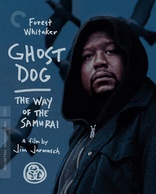
Movie rating
7.7 | / 10 |
Blu-ray rating
| Users | 5.0 | |
| Reviewer | 3.5 | |
| Overall | 3.8 |
Overview
Ghost Dog: The Way of the Samurai (1999)
A professional hit man living by the ancient code of the samurai finds himself targeted for death by the Mafia.
Starring: Forest Whitaker, John Tormey, Cliff Gorman, Dennis Liu (I), Frank MinucciDirector: Jim Jarmusch
| Drama | Uncertain |
| Surreal | Uncertain |
| Crime | Uncertain |
| Thriller | Uncertain |
Specifications
Video
Video codec: MPEG-4 AVC
Video resolution: 1080p
Aspect ratio: 1.85:1
Original aspect ratio: 1.85:1
Audio
English: DTS-HD Master Audio 5.1 (48kHz, 24-bit)
Subtitles
English SDH
Discs
50GB Blu-ray Disc
Single disc (1 BD)
Playback
Region A (locked)
Review
Rating summary
| Movie | 3.0 | |
| Video | 5.0 | |
| Audio | 5.0 | |
| Extras | 4.0 | |
| Overall | 3.5 |
Ghost Dog: The Way of the Samurai Blu-ray Movie Review
Reviewed by Dr. Svet Atanasov November 18, 2020Jim Jarmusch's "Ghost Dog: The Way of the Samurai" (1999) arrives on Blu-ray courtesy of Criterion. The supplemental features on the disc include archival interviews with the director and cast members; new video essay on RZA's original score for the film; deleted scenes and outtakes; and more. In English, with optional English SDH subtitles for the main feature. Region-A "locked".
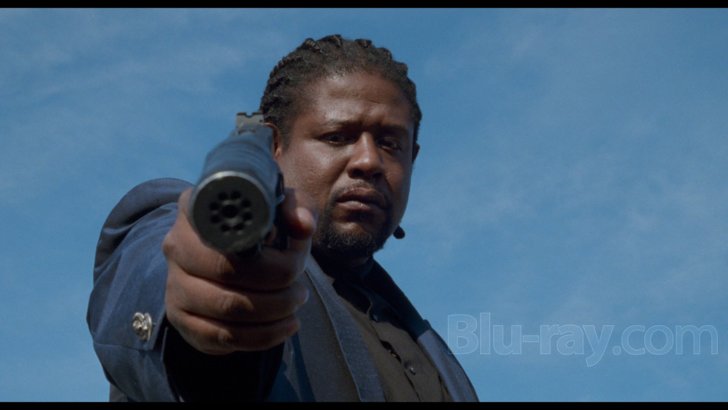
The birdman
A direct comparison between Jim Jarmusch’s Ghost Dog: The Way of the Samurai and Jean-Pierre Melville’s Le Samouraï seems unavoidable. Both films are about killers who live their lives while following a strict code of beliefs that define their work. Both films essentially promote murder as a misunderstood art form. Also, their fans would be happy to sell them to you as some of the coolest films ever made. But is such a comparison actually justified?
In Jarmusch’s film, Forest Whitaker plays a man who spends his time between two completely different worlds. In the first, he is a modern-day samurai who views his existence through the prism of centuries-old ‘truths’ that are utterly incompatible with his environment. Because he is a loner very few people notice his existence, which makes it easier for him to pretend that what he does is normal. In the second, he is a pragmatic executioner for an aging Italian mafioso who years ago saved his life. The two never meet. When they communicate they use pigeons to exchange their messages. For reasons that should not be spoiled, eventually the modern-day samurai and the pragmatic executioner are forced to become one.
In Melville’s film, Alain Delon’s killer operates in a completely different environment. He does not have a split personality either. He is as effective as he is because he is a brilliant chameleon that always finds a way to outmaneuver his opponents. He is a loner too, but not a social outcast like Whitaker’s character.
Both films spend a great deal of time examining the unique personalities of these unusual killers. They also reveal similar interest in the mechanics of their work. But they have drastically different identities, and not because they were conceived during different decades.
In Jarmusch’s film, the killer is surrounded by goofy Italian gangsters that very quickly compromise his legitimacy. Also, the more his ‘truths’ begin to interfere with his actions, the easier it becomes to see that his entire schtick is just a ruse to build up the cool in the film. In Melville’s film the cool has a vastly different organic quality. It materializes because Melville removes the glamour from the killer's actions and at the same time surrounds him with authentic characters that further strengthen his image.
A sense of humor that is typical for Jarmusch's early work occasionally brings in some much needed excitement, but it cannot hold the different parts of his film together. The formula just isn’t right. There are too many incompatible ideas and too much cliched posturing that make the spiritual journey of Whitaker’s killer impossible to take seriously. Or could it be that this is precisely what Jarmusch intended -- to have the killer's credibility and the business he is a part of destroyed by overcooked glamorization? It is a very unlikely possibility, for two simple reasons. First, it is clear that Jarmusch was in fact looking for the right formula that would allow him to successfully blend elements of different genres in a coherent film. Second, it is even clearer that Whitaker isn’t acting in that kind of a punishing film.
Henry Silva, Cliff Gorman, John Tormey, Victor Argo, Richard Portnow, and Gene Ruffini play the most memorable mafiosi.
The film’s soundtrack was created by RZA, one of the key members of the popular hip-hop band Wu-Tang Clan.
Ghost Dog: The Way of the Samurai Blu-ray Movie, Video Quality 
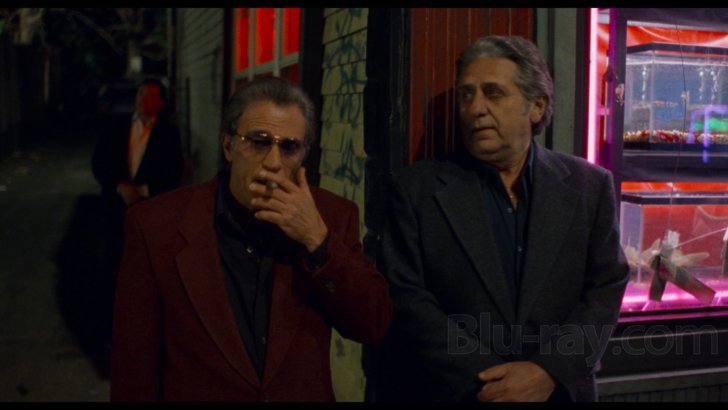
Presented in its original aspect ratio of 1.85:1, encoded with MPEG-4 AVC and granted a 1080p transfer, Ghost Dog: The Way of the Samurai arrives on Blu-ray courtesy of Criterion.
The following text appears inside the booklet that is provided with this Blu-ray release:
"This new digital transfer was created in 16-bit 4K resolution on Lasergraphics Director film scanner from the 35mm original A/B camera negative. Thousands of instances of dirt, debris, scratches, splices, and warps were manually removed using MTI Film's DRS, while Digital Vision's Phoenix was used for jitter, flicker, and small dirt. The original 5.1 surround soundtrack was remastered from the 35mm magnetic print master using Avid's Pro Tools and iZotope RX.
Transfer supervisor: Jim Jarmusch, Lee Kline.
Colorist: Gregg Garvin/Roundabout Entertainment, Burbank, CA."
The management of natural light can leave the impression that some parts of the film are not quite as sharp and nicely defined as they ought to be, but the new master that was created for this release is outstanding. In fact, I would say that even in native 4K virtually all of the 'flatness' that emerges in backgrounds will be reproduced as it is retained in 1080p because it is part of the way the camera has captured shadow definition, highlights, and other native nuances. The color grading job very convincing. Saturation and hues should look superior in native 4K, but I don't think that the difference will be striking. I like how the color scheme looks in 1080p a lot. There are no traces of problematic digital correction. Image stability is excellent. Lastly, the entire film looks very, very healthy. (Note: This is a Region-A "locked" Blu-ray release. Therefore, you must have a native Region-A or Region-Free player in order to access its content).
Ghost Dog: The Way of the Samurai Blu-ray Movie, Audio Quality 
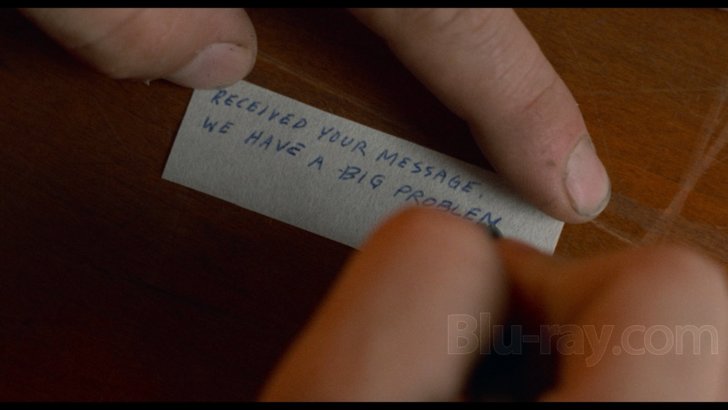
There is only one standard audio track on this Blu-ray release: English DTS-HD Master Audio 5.1. Optional English SDH subtitles are provided for the main feature.
The audio is clear, sharp, and very stable. There are some minor balance and dynamic fluctuations, but they are inherited. (Although there is quite a bit of music throughout the film, the soundtrack actually has a very organic quality). There are no transfer-specific anomalies to report in our review.
Ghost Dog: The Way of the Samurai Blu-ray Movie, Special Features and Extras 
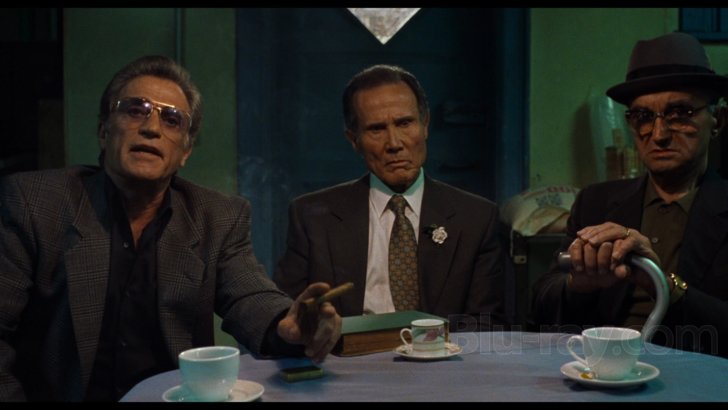
- Trailer - remastered vintage trailer for Ghost Dog: The Way of the Samurai. In English, not subtitled. (2 min, 1080p).
- Q&A With Jim - in this new program, Jim Jarmusch answers questions about Ghost Dog: The Way of the Samurai that were submitted by fans of the film. The program was create din June 2020. In English, not subtitled. (85 min, 1080p).
- Forest Whitaker, Isaach De Bankolé, and Michel B. Gillespie - in this video-conference-call, actors Forest Whitaker and Isaach De Bankolé recall their involvement with Ghost Dog: The Way of the Samurai and discuss what they believe to be the film's defining themes. The conversation is moderate by film scholar Michael B. Gillespie. In English, not subtitled. (30 min, 1080p).
- Casting with Ellen Lewis - in this new program, Ellen Lewis discusses her work with Jim Jarmusch and the casting process she oversaw during the production of Ghost Dog: The Way of the Samurai. In English, not subtitled. (16 min, 1080p).
- Shifu Shi Yan Ming - new interview with Shifu Shi Yan Ming, founder of the USA Shaolin Temple. In English, not subtitled. (6 min, 1080p).
- Archival Interviews - in English, not subtitled.
1. Jim Jarmusch, Forest Whitaker, and RZA (1999) - the content of the interview focuses on the conception of Ghost Dog: The Way of the Samurai as well as some of the contradictions in the film. (16 min, 1080i).
2. The Odyssey: A Journey Into The Life of a Samurai (2000) - this program features interviews with Jim Jarmusch, RZA, and Forest Whitaker. (22 min, 1080i).
- Flying Birds: The Music of "Ghost Dog" - in this program, RZA discusses his involvement with Ghost Dog: The Way of the Samurai. In English, not subtitled. (15 min, 1080p).
- Deleted Scenes and Outtakes - in English, not subtitled. (6 min, 1080i).
- Isolated Score - presented as Dolby Digital 2.0.
- Booklet - an illustrated booklet featuring an essay by critic Greg Tate and quotations from Hagakure: The Book of the Samurai by the early-eighteenth-century monk Yamamoto Tsunetomo, as well as technical credits.
Ghost Dog: The Way of the Samurai Blu-ray Movie, Overall Score and Recommendation 
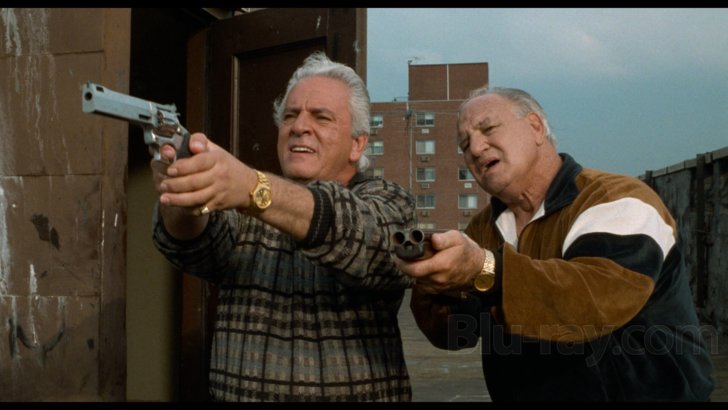
Ghost Dog: The Way of the Samurai tries so hard to be cool and arty at the same time that it almost immediately transforms the spiritual journey of Forest Whitaker's character into a dull parody. There are a few hilarious moments featuring a bunch of goofy Italian gangsters but they only confirm the obvious, which is that Jim Jarmusch could not quite figure out the right formula to make the film work as he intended. Criterion's release is sourced from a very solid exclusive new 4K master. RENT IT.
Similar titles
Similar titles you might also like

Gloria
1980

The Long Good Friday 4K
1980

King of New York
1990

Underworld U.S.A.
Limited Edition to 3000
1961

Le Samouraï 4K
1967

Revenge of the Green Dragons
2014

The Big Heat 4K
1953

Point Blank
1967

The Yakuza
Warner Archive Collection
1974

Choice of Arms
Le choix des armes
1981

Performance 4K
uses original UK version soundtrack
1970

Shaft's Big Score!
Warner Archive Collection
1972

The Killing of a Chinese Bookie
1976 and 1978 Versions
1976

Mikey and Nicky
1976

The Limits of Control
Arrow Academy
2009

Get Carter 4K
Warner Archive Collection
1971

The Friends of Eddie Coyle
1973

The Hit
1984

Game of Death
死亡遊戲 | Collector's Edition
1978

Blast of Silence
1.85:1 and 1.33:1 aspect ratio presentations
1961